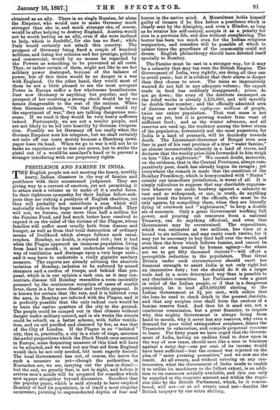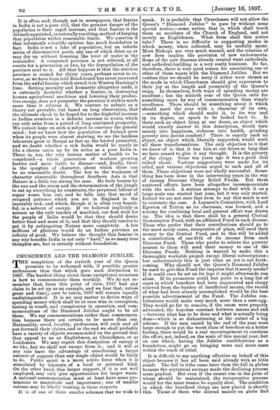PESTILENCE AND FAMINE IN INDIA. T HE English people are not
meeting the heavy, terribly heavy, Indian disasters in the way of famine and pestilence with their accustomed judgment. They are giving way to a current of emotion, yet not permitting it to attain such a volume as to make of it a useful force. In their righteous sympathy for their Indian fellow-sub- jects they are risking a paralysis of English charities, yet they will probably not contribute a sum which will materially relieve the huge mass of people affected. They will not, we foresee, raise more than half a million for the Famine Fund, and had much better have resolved to expend it on the relief of the victims of the Plague, whose families will suffer most cruelly both from disease and hunger, as well as from that total destruction of ordinary means of livelihood which always follows such catas- trophes. Bombay, no doubt, is reputed rich ; but it had when the Plague appeared an immense population living from hand to mouth ; it must undertake reforms in the way of ventilation and drainage upon a very large scale ; and it may have to undertake a really gigantic sanitary measure. The experts are already advising the absolute isolation of Bombay, isolation to be enforced by armed steamers and a cordon of troops, and behind that pro- posal, which is in our opinion a rash one, as it may con- centrate disease till Bombay resembles a room incurably poisoned by the continuous reception of cases of scarlet fever, there is a far more drastic and terrible proposal. It is known for certain that the rats, and it is believed even the ants, in Bombay are infected with the Plague, and it is perfectly possible that the only radical cure would be to burn the native quarters of the city to the ground. The people could be camped out in that climate without danger under military control, and in six weeks the streets could be rebuilt on a better scheme, with fuller ventila- tion, and on soil purified and cleansed by fire, as was that of the City of London. If the Plague in an " isolated " city, that is, practically, a city in a state of siege, assumes the awful proportions which the Black Death once assumed in Europe, some despairing measure of this kind will have to be adopted, and we need not say that aid from England would then be not only needed, but most eagerly desired. The local Government has not, of course, the nerve for such a measure as yet—though the authorities in Kurrachee are, we see, carrying out the plan in detail— but the end, we greatly fear, is not in sight, and before it arrives men's minds will be prepared for remedies which now appear altogether beyond discussion. Recollect that the popular panic, which is said already to have emptied Bombay of half its population, is of itself a most singular occurrence, pointing to unprecedented depths of fear and horror in the native mind. A Mussulman holds himself guilty of treason if he flies before a pestilence which is clearly sent by the Almighty, and even a Hindoo, as long as he retains his self-control, accepts it as a penalty for sins in a previous life, and dies without complaining. The horror has been too much even for the Indian religious resignation, and remedies will be possible of which in calmer times the guardians of the community could not dream. English philanthropy should have devoted itself specially to Bombay.
The Famine must be met in a stronger way, for it may be a calamity that may tax even the British Empire. The Government of India, very rightly, are doing all they can to avoid panic; but it is evident that their alarm-is deeper than they choose to avow. The rains so imperatively wanted do not fall in any adequate volume ; the export trade in food has suddenly disappeared; prices do not go down ; the army of the destitute encamped on the relief works is already 1,125,000, and will speedily be double that number ; and the officially admitted area of distress now includes eighty-one millions of people, twice our entire population. That vast mass is not dying as yet, but it is growing weaker from want of sufficient food ; and as the winter advances, and all reserves are used up, the tendency among the lower strata of the population, fortunately not the most numerous, for India is a land of peasants, will be decidedly towards death. The Lieutenant-Governor of Bengal even sees fear in part of his vast province of a true "water famine," an almost inconceivable calamity in a land of rivers, and declares that the weekly price-lists forwarded to him weigh on him "like a nightmare." We cannot doubt, moreover, on the evidence, that in the Central Provinces, always com- paratively poor, death has already begun its ravages ; yet everywhere the remark is made that the condition of the Bombay Presidency, which is honeycombed with " States " outside our immediate jurisdiction, is worst of all. It is simply ridiculous to suppose that any charitable organists- tion whatever can make headway against a calamity so vast and so widespread, or can, in truth, do anything except break the hearts of the officials, who must be its only agents, by compelling them, when they are literally dying of overwork and "nightmares," to keep a double set of accounts. Only a great Government working full power, and pouring out resources from a national Treasury, can do anything effectual, and even that Government may be overstrained. The expenditure, which was estimated at two millions, has risen at a bound to six millions, and may easily reach twelve, for it may yet be necessary to buy food half over the world, and even then the fever which follows famine, and cannot be averted or even treated by human agency—for where are we to get fifty thousand doctors ?—will effect a perceptible reduction in the population. That Great Britain under such circumstances should exert her financial strength to assist India is not only right but an imperative duty ; but she should do it on a larger scale and in a more determined way than is possible to any charitable committee. Let Parliament vote a grant in relief of the Indian people, or if that is a dangerous precedent, let it lend £10,000,000 sterling to the Indian Government at 2; per cent., with orders that the loan be used to check death in the poorest districts, and that any surplus over shall form the nucleus of a famine reserve fund. And then let it send out, not a cumbrous commission, but a great financier, to inquire why this mighty Government is always living from hand to mouth, why it never has any reserves, why even a demand for poor relief extinguishes surpluses, drains the Treasuries to exhaustion, and compels perpetual recourse to loans. For forty years we have urged that the Govern- ment of India, having no endless fund to draw upon in the way of new taxes, should save like a man in business against a rainy day—one per cent. of its income would have been sufficient—but the counsel was rejected on the plea of " more pressing necessities," and we now see the result. At all events, and without entering on any con- troversies, what the Government of India needs to enable it to utilise its machinery to the fullest extent, is an addi- tion to its resources actually available, and this can only be supplied to the requisite amount and within the requi- site time by the British Parliament, which, be it remem- bered, will not—or at all events need not—burden the British taxpayer by one extra shilling. It is often said, though not in newspapers, that famine in India is not a pure evil, that the greatest danger of the population is their rapid increase, and that famine is the divinely appointed, or naturally resulting, method of keeping that population within reasonable limits. We question if that inhumanly scientific opinion has much foundation in fact. India is not a lake of population, but an infinite series of disconnected pools, any one of which dries up or may dry up without lowering the level of water in the remainder. A congested province is not relieved, at all events for a generation or two, by the depopulation of the province next to it. All that happens is that the stricken province is ruined for thirty years perhaps never to re- cover, as we have been told Bundelcund has never recovered from the awful famine which struck it in Warren Hastings's time. Setting morality and humanity altogether aside, it is extremely doubtful whether a famine, in destroying human agricultural machines and lowering their produc- tive energy, does not pauperise the province it strikes much more than it relieves it. We venture to submit as a theory not provable, but based on long observation, that the ultimate check to be hoped for to the frightful increase in Indian numbers is a definite increase in wants, which can only arise from a period of long continued prosperity. We cannot hope on such a subject to convince the general mind ; but we know how the population of Ireland grew when its people were almost starving, we see the landless labourers grow in Bengal as fast as the landed peasantry, and we doubt whether a rich India would be nearly so like a cheese eaten up by its mites as a poor India is. There is, too, the very serious matter of health to be considered—a whole generation of workers growing feebler and more liable to disease—and, finally, there is the quevtion of character, about which there can be no reasonable doubt. The key to the weakness of character observable throughout Southern Asia is that Nature is a little too strong for man. He feels beaten by the sun and the storm and the determination of the jungle to eat up everything he constructs, the perpetual labour of repair wears him out, and he falls into that mood of resigned patience which you see in England in the incurably sick, and which, though it is often very beauti- ful, is a. solvent of energy. If we believed implicitly in science as the only teacher of mankind, our first wish for the people of India would be that they should, desire better food and more of it, and that they should resolve to get it by subjugating Nature more completely. A few millions of gluttons would do an Indian province an infinity of good. We believe the thought that famine in any way benefits India is not only "hard," as so many true thoughts are, but is entirely without foundation.







































 Previous page
Previous page